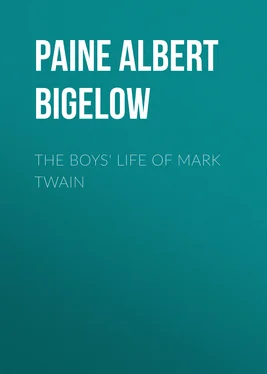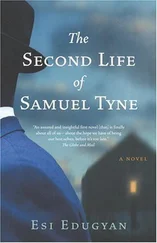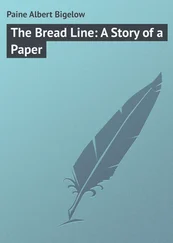Albert Paine - The Boys' Life of Mark Twain
Здесь есть возможность читать онлайн «Albert Paine - The Boys' Life of Mark Twain» — ознакомительный отрывок электронной книги совершенно бесплатно, а после прочтения отрывка купить полную версию. В некоторых случаях можно слушать аудио, скачать через торрент в формате fb2 и присутствует краткое содержание. Издательство: Иностранный паблик, Жанр: Биографии и Мемуары, foreign_antique, на английском языке. Описание произведения, (предисловие) а так же отзывы посетителей доступны на портале библиотеки ЛибКат.
- Название:The Boys' Life of Mark Twain
- Автор:
- Издательство:Иностранный паблик
- Жанр:
- Год:неизвестен
- ISBN:нет данных
- Рейтинг книги:5 / 5. Голосов: 1
-
Избранное:Добавить в избранное
- Отзывы:
-
Ваша оценка:
- 100
- 1
- 2
- 3
- 4
- 5
The Boys' Life of Mark Twain: краткое содержание, описание и аннотация
Предлагаем к чтению аннотацию, описание, краткое содержание или предисловие (зависит от того, что написал сам автор книги «The Boys' Life of Mark Twain»). Если вы не нашли необходимую информацию о книге — напишите в комментариях, мы постараемся отыскать её.
The Boys' Life of Mark Twain — читать онлайн ознакомительный отрывок
Ниже представлен текст книги, разбитый по страницам. Система сохранения места последней прочитанной страницы, позволяет с удобством читать онлайн бесплатно книгу «The Boys' Life of Mark Twain», без необходимости каждый раз заново искать на чём Вы остановились. Поставьте закладку, и сможете в любой момент перейти на страницу, на которой закончили чтение.
Интервал:
Закладка:
Orion Clemens returned to St. Louis, where he was receiving a salary of ten dollars a week—high wage for those days—out of which he could send three dollars weekly to the family. Pamela, who played the guitar and piano very well, gave music lessons, and so helped the family fund. Pamela Clemens, the original of Cousin Mary, in "Tom Sawyer," was a sweet and noble girl. Henry was too young to work, but Sam was apprenticed to a printer named Ament, who had recently moved to Hannibal and bought a weekly paper, "The Courier." Sam agreed with his mother that the printing trade offered a chance for further education without attending school, and then, some day, there might be wages.
VII.
THE APPRENTICE
The terms of Samuel Clemens's apprenticeship were the usual thing for that day: board and clothes—"more board than clothes, and not much of either," Mark Twain used to say.
"I was supposed to get two suits of clothes a year, but I didn't get them. I got one suit and took the rest out in Ament's old garments, which didn't fit me in any noticeable way. I was only about half as big as he was, and when I had on one of his shirts I felt as if I had on a circus-tent. I had to turn the trousers up to my ears to make them short enough."
Another apprentice, a huge creature, named Wales McCormick, was so large that Ament's clothes were much too small for him. The two apprentices, fitted out with their employer's cast-off garments, were amusing enough, no doubt. Sam and Wales ate in the kitchen at first, but later at the family table with Mr. and Mrs. Ament and Pet McMurry, a journeyman printer. McMurry was a happy soul, as one could almost guess from his name. He had traveled far and learned much. What the two apprentices did not already know, Pet McMurry could teach them. Sam Clemens had promised to be a good boy, and he was so, by the standards of boyhood. He was industrious, regular at his work, quick to learn, kind, and truthful. Angels could hardly be more than that in a printing-office. But when food was scarce, even an angel—a young printer-angel—could hardly resist slipping down the cellar stairs at night, for raw potatoes, onions, and apples, which they cooked in the office, where the boys slept on a pallet on the floor. Wales had a wonderful way of cooking a potato which his fellow apprentice never forgot.
How one wishes for a photograph of Sam Clemens at that period! But in those days there were only daguerreotypes, and they were expensive things. There is a letter, though, written long afterward, by Pet McMurry to Mark Twain, which contains this paragraph:
"If your memory extends so far back, you will recall a little sandy- haired boy of nearly a quarter of a century ago, in the printing- office at Hannibal, over the Brittingham drug-store, mounted upon a little box at the case, who used to love to sing so well the expression of the poor drunken man who was supposed to have fallen by the wayside, 'If ever I get up again, I'll stay up—if I kin.'"
And with this portrait we must be content—we cannot doubt its truth.
Sam was soon office favorite and in time became chief stand-by. When he had been at work a year, he could set type accurately, run the job press to the tune of "Annie Laurie," and he had charge of the circulation. That is to say, he carried the papers—a mission of real importance, for a long, sagging span of telegraph-wire had reached across the river to Hannibal, and Mexican-war news delivered hot from the front gave the messenger a fine prestige.
He even did editing, of a kind. That is to say, when Ament was not in the office and copy was needed, Sam hunted him up, explained the situation, and saw that the necessary matter was produced. He was not ambitious to write—not then. He wanted to be a journeyman printer, like Pet, and travel and see the world. Sometimes he thought he would like to be a clown, or "end man" in a minstrel troupe. Once for a week he served as subject for a traveling hypnotist-and was dazzled by his success.
But he stuck to printing, and rapidly became a neat, capable workman. Ament gave him a daily task, after which he was free. By three in the afternoon he was likely to finish his stint. Then he was off for the river or the cave, joining his old comrades. Or perhaps he would go with Laura Hawkins to gather wild columbine on the high cliff above the river, known as Lover's Leap. When winter came these two sometimes went to Bear Creek, skating; or together they attended parties, where the old-fashioned games "Ring-around-Rosy" and "Dusty Miller" were the chief amusements.
In "The Gilded Age," Laura Hawkins at twelve is pictured "with her dainty hands propped into the ribbon-bordered pockets of her apron . . . a vision to warm the coldest heart and bless and cheer the saddest." That was the real Laura, though her story in that book in no way resembles the reality.
It was just at this time that an incident occurred which may be looked back upon now as a turning-point in Samuel Clemens's life. Coming home from the office one afternoon, he noticed a square of paper being swept along by the wind. He saw that it was printed—was interested professionally in seeing what it was like. He chased the flying scrap and overtook it. It was a leaf from some old history of Joan of Arc, and pictured the hard lot of the "maid" in the tower at Rouen, reviled and mistreated by her ruffian captors. There were some paragraphs of description, but the rest was pitiful dialogue.
Sam had never heard of Joan before—he knew nothing of history. He was no reader. Orion was fond of books, and Pamela; even little Henry had read more than Sam. But now, as he read, there awoke in him a deep feeling of pity and indignation, and with it a longing to know more of the tragic story. It was an interest that would last his life through, and in the course of time find expression in one of the rarest books ever written.
The first result was that Sam began to read. He hunted up everything he could find on the subject of Joan, and from that went into French history in general—indeed, into history of every kind. Samuel Clemens had suddenly become a reader—almost a student. He even began the study of languages, German and Latin, but was not able to go on for lack of time and teachers.
He became a hater of tyranny, a champion of the weak. Watching a game of marbles or tops, he would remark to some offender, in his slow drawling way, "You mustn't cheat that boy."
And the cheating stopped, or trouble followed.
VIII.
ORION'S PAPER
A Hannibal paper, the "Journal," was for sale under a mortgage of five hundred dollars, and Orion Clemens, returning from St. Louis, borrowed the money and bought it. Sam's two years' apprenticeship with Ament had been completed, and Orion felt that together they could carry on the paper and win success. Henry Clemens, now eleven, was also taken out of school to learn type-setting.
Orion was a better printer than proprietor. Like so many of his family, he was a visionary, gentle and credulous, ready to follow any new idea. Much advice was offered him, and he tried to follow it all.
He began with great hopes and energy. He worked like a slave and did not spare the others. The paper was their hope of success. Sam, especially, was driven. There were no more free afternoons. In some chapters written by Orion Clemens in later life, he said:
"I was tyrannical and unjust to Sam. He was swift and clean as a good journeyman. I gave him 'takes,' and, if he got through well, I begrudged him the time and made him work more."
Orion did not mean to be unjust. The struggle against opposition and debt was bitter. He could not be considerate.
The paper for a time seemed on the road to success, but Orion worked too hard and tried too many schemes. His enthusiasm waned and most of his schemes turned out poorly. By the end of the year the "Journal" was on the down grade.
Читать дальшеИнтервал:
Закладка:
Похожие книги на «The Boys' Life of Mark Twain»
Представляем Вашему вниманию похожие книги на «The Boys' Life of Mark Twain» списком для выбора. Мы отобрали схожую по названию и смыслу литературу в надежде предоставить читателям больше вариантов отыскать новые, интересные, ещё непрочитанные произведения.
Обсуждение, отзывы о книге «The Boys' Life of Mark Twain» и просто собственные мнения читателей. Оставьте ваши комментарии, напишите, что Вы думаете о произведении, его смысле или главных героях. Укажите что конкретно понравилось, а что нет, и почему Вы так считаете.












